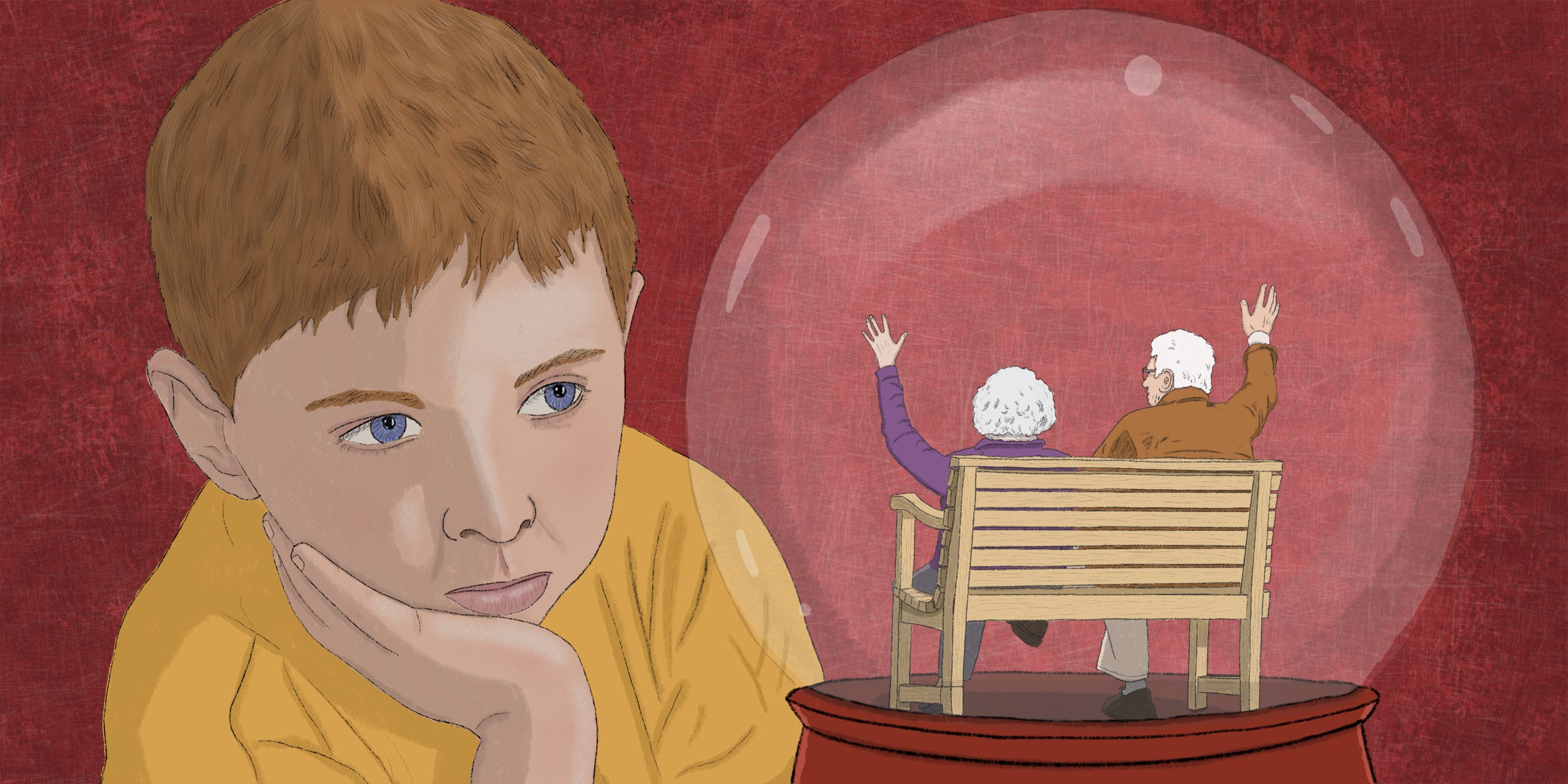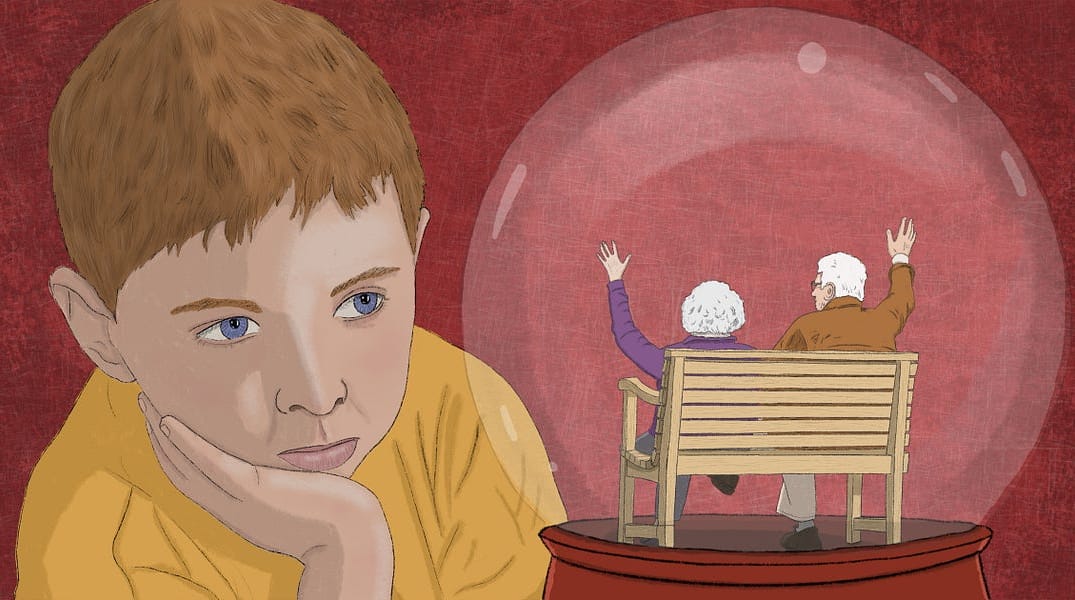
My youngest child has an uncanny radar for his grandfather. He is not deterred or distracted by trivialities like exhaustion or hunger or siblings. As soon as he hears my dad’s shuffling gait, he launches himself at him — sometimes, in his haste, nearly bowling him over. And whenever my dad sits, which is quite often these days, he’s immediately confronted by a lapful of squirming toddler, on the business end of near-frantic hugs.
But like grandparents everywhere, when Covid-19 threatened to sweep through our community like an implacable fire, my parents found themselves suddenly negotiating relationships with the people they love from behind a six-foot gulf.
Sign up for The Bold Italic newsletter to get the best of the Bay Area in your inbox every week.
Four years ago, I upended a life I loved in my adoptive city on the East Coast to move back to the Bay Area and give my children the opportunity to know their grandparents. I had last lived in California in the mid-’90s, just before I departed for college in Massachusetts. What was meant to be a temporary sojourn had deepened into roots. And although I harbored vague aspirations of returning to California someday, with each passing year, those thoughts receded.
While my kids loved seeing their grandparents, the intensity of these holidays was no substitute for the quotidian rhythms of regular contact.
When my husband and I had children, the lure of my childhood hometown pulled me in a way it hadn’t since those first nights spent in my dorm room, the disquiet growing inside me, as I realized that I’d never be able to return home in quite the same way.
Of course my dad and mom, as befitting dutiful grandparents, regularly made the pilgrimage across the country to dote on their grandchildren: first a granddaughter, born in 2011, followed by grandsons in 2013 and 2016. They’d stay for a month at a time, uneasily sharing the close quarters of urban living, for the chance to swing a grandchild on their knee and hand her back when the storm clouds gathered on her tiny face.
Soon, however, the disembodied voices on the other end of the line, bookended by infrequent visits, just weren’t enough. While my kids loved seeing their grandparents, the intensity of these holidays was no substitute for the quotidian rhythms of regular contact: weekly Sunday dinners, impromptu check-ins, standing commitments to lend their applause at school events.
That’s how we found ourselves flying across the country — the contents of our home sealed in a moving truck and sent barreling ahead of us on the open highway — six weeks after my youngest was born.
Those first few months were hard. In a reversal of our years out East, the five of us piled into my parents’ four-bedroom house, set among the yellow hills of my hometown. Stepping over the threshold was like entering a place preserved in amber.
My bedroom, for example, had escaped unscathed from the passage of time — the bed covered by a limp comforter, the white bookshelves lined with comic books, the menagerie of stuffed animals standing watch. My daughter made a beeline for the biggest one — a platypus with velvet-like fur — and immediately started coughing when a fine layer of dust shook loose. I snatched it out of her hands. We’d need to scour the place; it had possibly been untouched since 1997.
Being back in my childhood hometown was strange in other ways, with everything familiar and also completely different. When I left, the Bay Area had not yet become the technological hub it is today. The streets were quiet — it was possible to travel from San Carlos to San Francisco in 20 minutes, a journey that can take up to an hour (or more) in traffic now. The sleepy downtown, where my mother would take me for grilled cheese sandwiches at the counter at Woolworth’s, has been transformed into a gleaming main street packed with cafés and couples pushing strollers.
But we acclimated, settling down in an apartment close by, and slowly the relationship I had hoped to build between my parents and children began to materialize, brewed in a potent mixture of proximity, love, and overindulgence.
At this year’s preschool Thanksgiving performance, my son strained on tiptoes, while his classmates bobbed and sang around him. Only after he spotted my dad — the family archivist — watching through the lens of his ever-present camera phone, did he slip lockstep into the turkey dance, his ebullient voice rising above the music.
My dad is a great cook, a vocation discovered late in life, and he delighted in preparing our favorite dishes. He’d fire up his wok to the glee of his grandchildren and fruitlessly admonish them to keep their distance as the flames licked its sloped sides.
After dinner one night, while we cleaned up, my children carted a precarious stack of books to him to read. By the fifth book, he was nodding off. My older children nudged him awake, impatient for more, but my youngest merely nestled against his bulk, content to be near the thrum of his heart.
But the pandemic disrupted this fragile idyll. Now, my parents are again the disembodied voices on the other end of the line — a forehead, a hand, a vertiginous view of the ceiling. (They aren’t very good with FaceTime and can’t operate Zoom.)
My children are also still at an age where, without the anchor of eye contact or the weight of a physical presence, sustained conversation eludes them. For my son’s birthday in March, we tried to corral everyone into a rousing rendition of “Happy Birthday” over FaceTime. But between the spotty internet and the lure of new toys, my parents were singing to an empty chair, their expressions crestfallen. “He’ll forget about us,” my mom fretted.
“Unprecedented” is a word that’s frequently employed to describe recent events and you only have to see the eerily empty streets, the stadiums purged of crowds, the cancellations affecting every industry, to acknowledge its truth. It’s hard to overstate how frightening this virus is, how merciless and random it can be. What’s not random, however, is the virus’ effect on the elderly — up to 80% of the fatalities come from those 65 and older.
Still, social isolation is its own disease with attendant risks and morbidities: cognitive decline, cardiovascular disease, stroke, depression, stress. My dad suffered a minor stroke four years ago; my mother has long contended with chronic lupus. Cloistered in their home, shut off from contact with their grandchildren and community, what toll is being exacted on their health?
With the growing trend of baby boomers following adult children to be close to grandchildren and those (like us) who trod the inverse path, there are many families in our situation. And with so much still unknown about the disease, including a timeline for the development of viable vaccines or treatments, no rescue is on the horizon.
The irony of moving 3,000 miles to be near my parents only to be thwarted by a wayward virus, seemingly farther now than any bicoastal distance, is not lost on me.
Over Zoom and Facebook, my friends and I share our anxieties. Some of us have parents who point out the uncomfortable truth that their remaining time is possibly measured in months or a handful of years, not the endless stretch of decades we might have deluded ourselves into imagining in better times. Are encounters mediated by glass or masks and six feet of distance really the best way to spend it? To be so close, yet unfathomably far?
Given the unknowns, these questions feel impossible to address. And as the country begins to open up again, they’ll take on renewed urgency. However, for each family, the calculus will be necessarily different, with no guarantees or ready answers. While schools are still closed, we are considering sheltering in place with my parents, cocooning ourselves in a quarantine bubble. Another family may decide to avoid even this risk, with the hope that there’ll be many more years together once the danger has definitively passed.
Meanwhile, the irony of moving 3,000 miles to be near my parents only to be thwarted by a wayward virus, seemingly farther now than any bicoastal distance, is not lost on me. But we adjust, recalculate, balance risk against reward.
Last week, my husband took my youngest — a mask slipped over his tiny face, repeated dry runs with masking tape to mark out the distance he’d need to maintain — to see his beloved grandparents. When he returned, he recounted the visit with barely contained excitement.
“I was good,” he said proudly. “I was so far from grandpa and grandma, but they could still hear me and I sang a song for them!” His smile was blinding.
Then he paused a beat, as if considering intently his next words: “Now — when can I hug them?”







